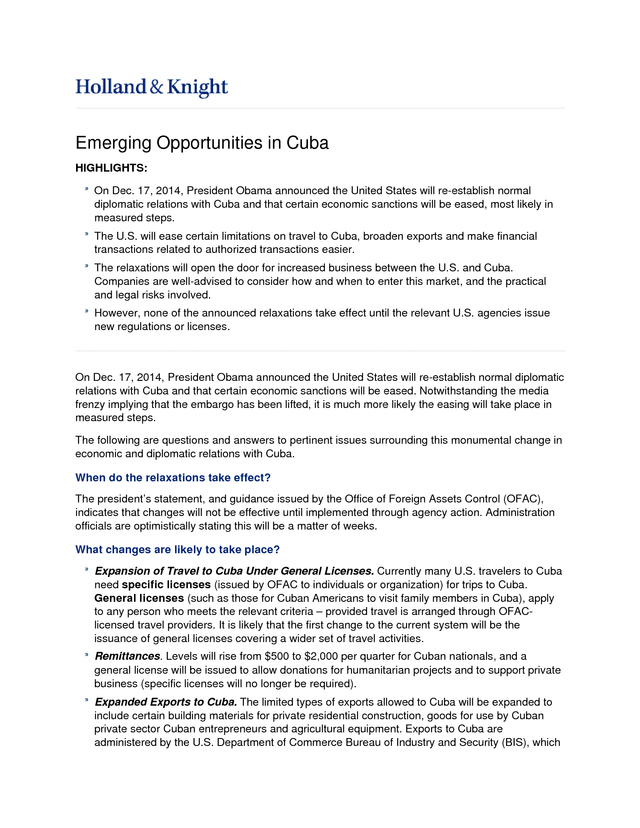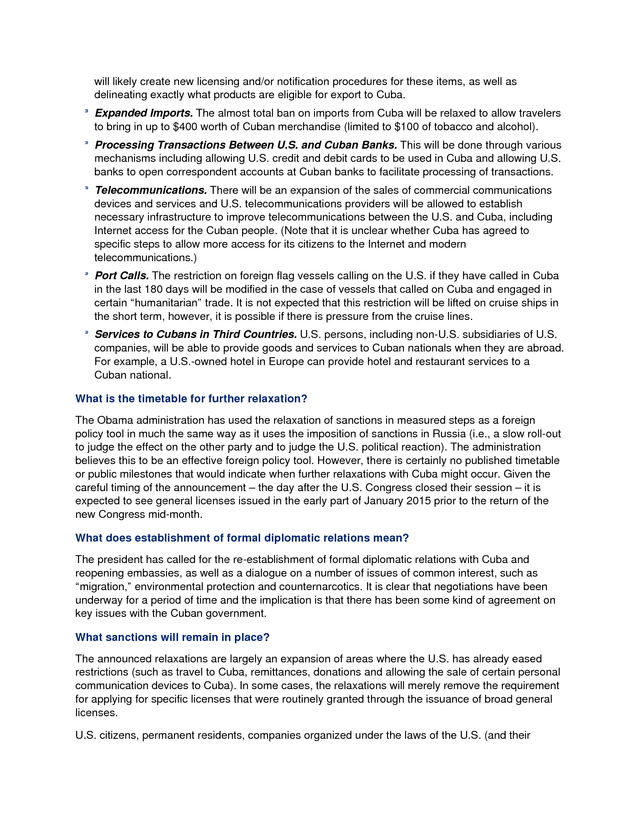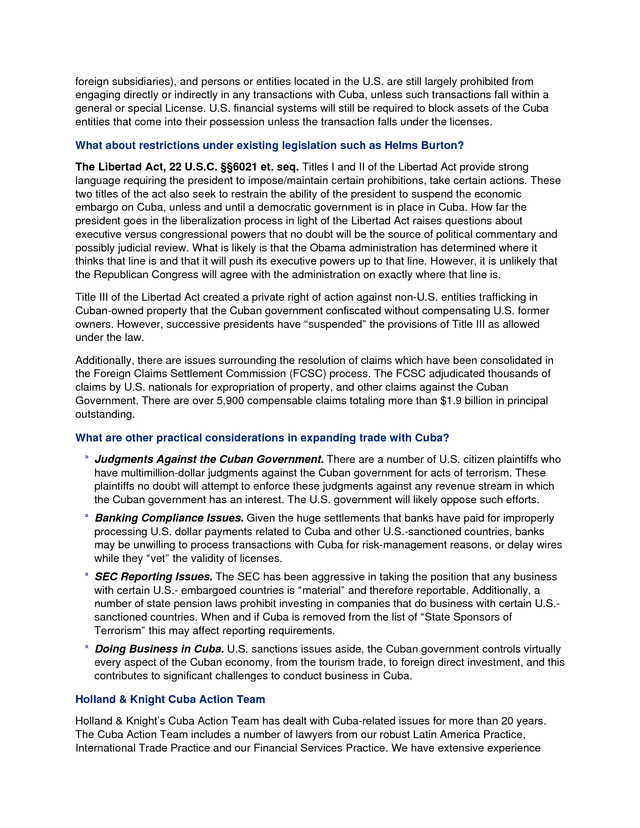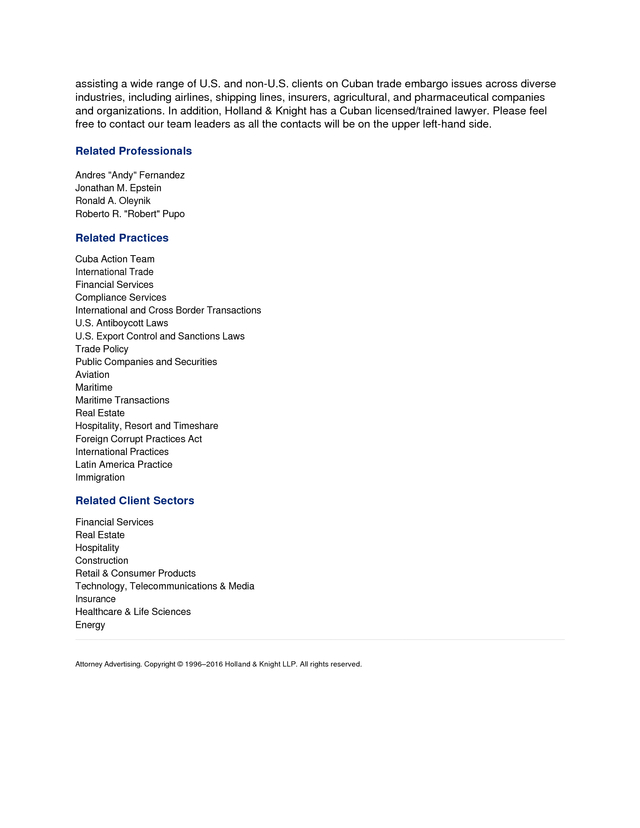Description
Emerging Opportunities in Cuba
HIGHLIGHTS:
On Dec. 17, 2014, President Obama announced the United States will re-establish normal
diplomatic relations with Cuba and that certain economic sanctions will be eased, most likely in
measured steps.
The U.S. will ease certain limitations on travel to Cuba, broaden exports and make financial
transactions related to authorized transactions easier.
The relaxations will open the door for increased business between the U.S. and Cuba.
Companies are well-advised to consider how and when to enter this market, and the practical
and legal risks involved.
However, none of the announced relaxations take effect until the relevant U.S.
agencies issue new regulations or licenses. On Dec. 17, 2014, President Obama announced the United States will re-establish normal diplomatic relations with Cuba and that certain economic sanctions will be eased. Notwithstanding the media frenzy implying that the embargo has been lifted, it is much more likely the easing will take place in measured steps. The following are questions and answers to pertinent issues surrounding this monumental change in economic and diplomatic relations with Cuba. When do the relaxations take effect? The president’s statement, and guidance issued by the Office of Foreign Assets Control (OFAC), indicates that changes will not be effective until implemented through agency action.
Administration officials are optimistically stating this will be a matter of weeks. What changes are likely to take place? Expansion of Travel to Cuba Under General Licenses. Currently many U.S. travelers to Cuba need specific licenses (issued by OFAC to individuals or organization) for trips to Cuba. General licenses (such as those for Cuban Americans to visit family members in Cuba), apply to any person who meets the relevant criteria – provided travel is arranged through OFAClicensed travel providers.
It is likely that the first change to the current system will be the issuance of general licenses covering a wider set of travel activities. Remittances. Levels will rise from $500 to $2,000 per quarter for Cuban nationals, and a general license will be issued to allow donations for humanitarian projects and to support private business (specific licenses will no longer be required). Expanded Exports to Cuba. The limited types of exports allowed to Cuba will be expanded to include certain building materials for private residential construction, goods for use by Cuban private sector Cuban entrepreneurs and agricultural equipment.
Exports to Cuba are administered by the U.S. Department of Commerce Bureau of Industry and Security (BIS), which . will likely create new licensing and/or notification procedures for these items, as well as delineating exactly what products are eligible for export to Cuba. Expanded Imports. The almost total ban on imports from Cuba will be relaxed to allow travelers to bring in up to $400 worth of Cuban merchandise (limited to $100 of tobacco and alcohol). Processing Transactions Between U.S. and Cuban Banks. This will be done through various mechanisms including allowing U.S.
credit and debit cards to be used in Cuba and allowing U.S. banks to open correspondent accounts at Cuban banks to facilitate processing of transactions. Telecommunications. There will be an expansion of the sales of commercial communications devices and services and U.S. telecommunications providers will be allowed to establish necessary infrastructure to improve telecommunications between the U.S.
and Cuba, including Internet access for the Cuban people. (Note that it is unclear whether Cuba has agreed to specific steps to allow more access for its citizens to the Internet and modern telecommunications.) Port Calls. The restriction on foreign flag vessels calling on the U.S.
if they have called in Cuba in the last 180 days will be modified in the case of vessels that called on Cuba and engaged in certain “humanitarian” trade. It is not expected that this restriction will be lifted on cruise ships in the short term, however, it is possible if there is pressure from the cruise lines. Services to Cubans in Third Countries. U.S.
persons, including non-U.S. subsidiaries of U.S. companies, will be able to provide goods and services to Cuban nationals when they are abroad. For example, a U.S.-owned hotel in Europe can provide hotel and restaurant services to a Cuban national. What is the timetable for further relaxation? The Obama administration has used the relaxation of sanctions in measured steps as a foreign policy tool in much the same way as it uses the imposition of sanctions in Russia (i.e., a slow roll-out to judge the effect on the other party and to judge the U.S. political reaction).
The administration believes this to be an effective foreign policy tool. However, there is certainly no published timetable or public milestones that would indicate when further relaxations with Cuba might occur. Given the careful timing of the announcement – the day after the U.S.
Congress closed their session – it is expected to see general licenses issued in the early part of January 2015 prior to the return of the new Congress mid-month. What does establishment of formal diplomatic relations mean? The president has called for the re-establishment of formal diplomatic relations with Cuba and reopening embassies, as well as a dialogue on a number of issues of common interest, such as “migration,” environmental protection and counternarcotics. It is clear that negotiations have been underway for a period of time and the implication is that there has been some kind of agreement on key issues with the Cuban government. What sanctions will remain in place? The announced relaxations are largely an expansion of areas where the U.S. has already eased restrictions (such as travel to Cuba, remittances, donations and allowing the sale of certain personal communication devices to Cuba).
In some cases, the relaxations will merely remove the requirement for applying for specific licenses that were routinely granted through the issuance of broad general licenses. U.S. citizens, permanent residents, companies organized under the laws of the U.S. (and their .
foreign subsidiaries), and persons or entities located in the U.S. are still largely prohibited from engaging directly or indirectly in any transactions with Cuba, unless such transactions fall within a general or special License. U.S. financial systems will still be required to block assets of the Cuba entities that come into their possession unless the transaction falls under the licenses. What about restrictions under existing legislation such as Helms Burton? The Libertad Act, 22 U.S.C.
§§6021 et. seq. Titles I and II of the Libertad Act provide strong language requiring the president to impose/maintain certain prohibitions, take certain actions.
These two titles of the act also seek to restrain the ability of the president to suspend the economic embargo on Cuba, unless and until a democratic government is in place in Cuba. How far the president goes in the liberalization process in light of the Libertad Act raises questions about executive versus congressional powers that no doubt will be the source of political commentary and possibly judicial review. What is likely is that the Obama administration has determined where it thinks that line is and that it will push its executive powers up to that line.
However, it is unlikely that the Republican Congress will agree with the administration on exactly where that line is. Title III of the Libertad Act created a private right of action against non-U.S. entities trafficking in Cuban-owned property that the Cuban government confiscated without compensating U.S. former owners.
However, successive presidents have “suspended” the provisions of Title III as allowed under the law. Additionally, there are issues surrounding the resolution of claims which have been consolidated in the Foreign Claims Settlement Commission (FCSC) process. The FCSC adjudicated thousands of claims by U.S. nationals for expropriation of property, and other claims against the Cuban Government.
There are over 5,900 compensable claims totaling more than $1.9 billion in principal outstanding. What are other practical considerations in expanding trade with Cuba? Judgments Against the Cuban Government. There are a number of U.S. citizen plaintiffs who have multimillion-dollar judgments against the Cuban government for acts of terrorism.
These plaintiffs no doubt will attempt to enforce these judgments against any revenue stream in which the Cuban government has an interest. The U.S. government will likely oppose such efforts. Banking Compliance Issues.
Given the huge settlements that banks have paid for improperly processing U.S. dollar payments related to Cuba and other U.S.-sanctioned countries, banks may be unwilling to process transactions with Cuba for risk-management reasons, or delay wires while they “vet” the validity of licenses. SEC Reporting Issues. The SEC has been aggressive in taking the position that any business with certain U.S.- embargoed countries is “material” and therefore reportable.
Additionally, a number of state pension laws prohibit investing in companies that do business with certain U.S.sanctioned countries. When and if Cuba is removed from the list of “State Sponsors of Terrorism” this may affect reporting requirements. Doing Business in Cuba. U.S.
sanctions issues aside, the Cuban government controls virtually every aspect of the Cuban economy, from the tourism trade, to foreign direct investment, and this contributes to significant challenges to conduct business in Cuba. Holland & Knight Cuba Action Team Holland & Knight’s Cuba Action Team has dealt with Cuba-related issues for more than 20 years. The Cuba Action Team includes a number of lawyers from our robust Latin America Practice, International Trade Practice and our Financial Services Practice. We have extensive experience . assisting a wide range of U.S. and non-U.S. clients on Cuban trade embargo issues across diverse industries, including airlines, shipping lines, insurers, agricultural, and pharmaceutical companies and organizations. In addition, Holland & Knight has a Cuban licensed/trained lawyer.
Please feel free to contact our team leaders as all the contacts will be on the upper left-hand side. Related Professionals Andres "Andy" Fernandez Jonathan M. Epstein Ronald A. Oleynik Roberto R.
"Robert" Pupo Related Practices Cuba Action Team International Trade Financial Services Compliance Services International and Cross Border Transactions U.S. Antiboycott Laws U.S. Export Control and Sanctions Laws Trade Policy Public Companies and Securities Aviation Maritime Maritime Transactions Real Estate Hospitality, Resort and Timeshare Foreign Corrupt Practices Act International Practices Latin America Practice Immigration Related Client Sectors Financial Services Real Estate Hospitality Construction Retail & Consumer Products Technology, Telecommunications & Media Insurance Healthcare & Life Sciences Energy Attorney Advertising.
Copyright © 1996–2016 Holland & Knight LLP. All rights reserved. .
agencies issue new regulations or licenses. On Dec. 17, 2014, President Obama announced the United States will re-establish normal diplomatic relations with Cuba and that certain economic sanctions will be eased. Notwithstanding the media frenzy implying that the embargo has been lifted, it is much more likely the easing will take place in measured steps. The following are questions and answers to pertinent issues surrounding this monumental change in economic and diplomatic relations with Cuba. When do the relaxations take effect? The president’s statement, and guidance issued by the Office of Foreign Assets Control (OFAC), indicates that changes will not be effective until implemented through agency action.
Administration officials are optimistically stating this will be a matter of weeks. What changes are likely to take place? Expansion of Travel to Cuba Under General Licenses. Currently many U.S. travelers to Cuba need specific licenses (issued by OFAC to individuals or organization) for trips to Cuba. General licenses (such as those for Cuban Americans to visit family members in Cuba), apply to any person who meets the relevant criteria – provided travel is arranged through OFAClicensed travel providers.
It is likely that the first change to the current system will be the issuance of general licenses covering a wider set of travel activities. Remittances. Levels will rise from $500 to $2,000 per quarter for Cuban nationals, and a general license will be issued to allow donations for humanitarian projects and to support private business (specific licenses will no longer be required). Expanded Exports to Cuba. The limited types of exports allowed to Cuba will be expanded to include certain building materials for private residential construction, goods for use by Cuban private sector Cuban entrepreneurs and agricultural equipment.
Exports to Cuba are administered by the U.S. Department of Commerce Bureau of Industry and Security (BIS), which . will likely create new licensing and/or notification procedures for these items, as well as delineating exactly what products are eligible for export to Cuba. Expanded Imports. The almost total ban on imports from Cuba will be relaxed to allow travelers to bring in up to $400 worth of Cuban merchandise (limited to $100 of tobacco and alcohol). Processing Transactions Between U.S. and Cuban Banks. This will be done through various mechanisms including allowing U.S.
credit and debit cards to be used in Cuba and allowing U.S. banks to open correspondent accounts at Cuban banks to facilitate processing of transactions. Telecommunications. There will be an expansion of the sales of commercial communications devices and services and U.S. telecommunications providers will be allowed to establish necessary infrastructure to improve telecommunications between the U.S.
and Cuba, including Internet access for the Cuban people. (Note that it is unclear whether Cuba has agreed to specific steps to allow more access for its citizens to the Internet and modern telecommunications.) Port Calls. The restriction on foreign flag vessels calling on the U.S.
if they have called in Cuba in the last 180 days will be modified in the case of vessels that called on Cuba and engaged in certain “humanitarian” trade. It is not expected that this restriction will be lifted on cruise ships in the short term, however, it is possible if there is pressure from the cruise lines. Services to Cubans in Third Countries. U.S.
persons, including non-U.S. subsidiaries of U.S. companies, will be able to provide goods and services to Cuban nationals when they are abroad. For example, a U.S.-owned hotel in Europe can provide hotel and restaurant services to a Cuban national. What is the timetable for further relaxation? The Obama administration has used the relaxation of sanctions in measured steps as a foreign policy tool in much the same way as it uses the imposition of sanctions in Russia (i.e., a slow roll-out to judge the effect on the other party and to judge the U.S. political reaction).
The administration believes this to be an effective foreign policy tool. However, there is certainly no published timetable or public milestones that would indicate when further relaxations with Cuba might occur. Given the careful timing of the announcement – the day after the U.S.
Congress closed their session – it is expected to see general licenses issued in the early part of January 2015 prior to the return of the new Congress mid-month. What does establishment of formal diplomatic relations mean? The president has called for the re-establishment of formal diplomatic relations with Cuba and reopening embassies, as well as a dialogue on a number of issues of common interest, such as “migration,” environmental protection and counternarcotics. It is clear that negotiations have been underway for a period of time and the implication is that there has been some kind of agreement on key issues with the Cuban government. What sanctions will remain in place? The announced relaxations are largely an expansion of areas where the U.S. has already eased restrictions (such as travel to Cuba, remittances, donations and allowing the sale of certain personal communication devices to Cuba).
In some cases, the relaxations will merely remove the requirement for applying for specific licenses that were routinely granted through the issuance of broad general licenses. U.S. citizens, permanent residents, companies organized under the laws of the U.S. (and their .
foreign subsidiaries), and persons or entities located in the U.S. are still largely prohibited from engaging directly or indirectly in any transactions with Cuba, unless such transactions fall within a general or special License. U.S. financial systems will still be required to block assets of the Cuba entities that come into their possession unless the transaction falls under the licenses. What about restrictions under existing legislation such as Helms Burton? The Libertad Act, 22 U.S.C.
§§6021 et. seq. Titles I and II of the Libertad Act provide strong language requiring the president to impose/maintain certain prohibitions, take certain actions.
These two titles of the act also seek to restrain the ability of the president to suspend the economic embargo on Cuba, unless and until a democratic government is in place in Cuba. How far the president goes in the liberalization process in light of the Libertad Act raises questions about executive versus congressional powers that no doubt will be the source of political commentary and possibly judicial review. What is likely is that the Obama administration has determined where it thinks that line is and that it will push its executive powers up to that line.
However, it is unlikely that the Republican Congress will agree with the administration on exactly where that line is. Title III of the Libertad Act created a private right of action against non-U.S. entities trafficking in Cuban-owned property that the Cuban government confiscated without compensating U.S. former owners.
However, successive presidents have “suspended” the provisions of Title III as allowed under the law. Additionally, there are issues surrounding the resolution of claims which have been consolidated in the Foreign Claims Settlement Commission (FCSC) process. The FCSC adjudicated thousands of claims by U.S. nationals for expropriation of property, and other claims against the Cuban Government.
There are over 5,900 compensable claims totaling more than $1.9 billion in principal outstanding. What are other practical considerations in expanding trade with Cuba? Judgments Against the Cuban Government. There are a number of U.S. citizen plaintiffs who have multimillion-dollar judgments against the Cuban government for acts of terrorism.
These plaintiffs no doubt will attempt to enforce these judgments against any revenue stream in which the Cuban government has an interest. The U.S. government will likely oppose such efforts. Banking Compliance Issues.
Given the huge settlements that banks have paid for improperly processing U.S. dollar payments related to Cuba and other U.S.-sanctioned countries, banks may be unwilling to process transactions with Cuba for risk-management reasons, or delay wires while they “vet” the validity of licenses. SEC Reporting Issues. The SEC has been aggressive in taking the position that any business with certain U.S.- embargoed countries is “material” and therefore reportable.
Additionally, a number of state pension laws prohibit investing in companies that do business with certain U.S.sanctioned countries. When and if Cuba is removed from the list of “State Sponsors of Terrorism” this may affect reporting requirements. Doing Business in Cuba. U.S.
sanctions issues aside, the Cuban government controls virtually every aspect of the Cuban economy, from the tourism trade, to foreign direct investment, and this contributes to significant challenges to conduct business in Cuba. Holland & Knight Cuba Action Team Holland & Knight’s Cuba Action Team has dealt with Cuba-related issues for more than 20 years. The Cuba Action Team includes a number of lawyers from our robust Latin America Practice, International Trade Practice and our Financial Services Practice. We have extensive experience . assisting a wide range of U.S. and non-U.S. clients on Cuban trade embargo issues across diverse industries, including airlines, shipping lines, insurers, agricultural, and pharmaceutical companies and organizations. In addition, Holland & Knight has a Cuban licensed/trained lawyer.
Please feel free to contact our team leaders as all the contacts will be on the upper left-hand side. Related Professionals Andres "Andy" Fernandez Jonathan M. Epstein Ronald A. Oleynik Roberto R.
"Robert" Pupo Related Practices Cuba Action Team International Trade Financial Services Compliance Services International and Cross Border Transactions U.S. Antiboycott Laws U.S. Export Control and Sanctions Laws Trade Policy Public Companies and Securities Aviation Maritime Maritime Transactions Real Estate Hospitality, Resort and Timeshare Foreign Corrupt Practices Act International Practices Latin America Practice Immigration Related Client Sectors Financial Services Real Estate Hospitality Construction Retail & Consumer Products Technology, Telecommunications & Media Insurance Healthcare & Life Sciences Energy Attorney Advertising.
Copyright © 1996–2016 Holland & Knight LLP. All rights reserved. .

















